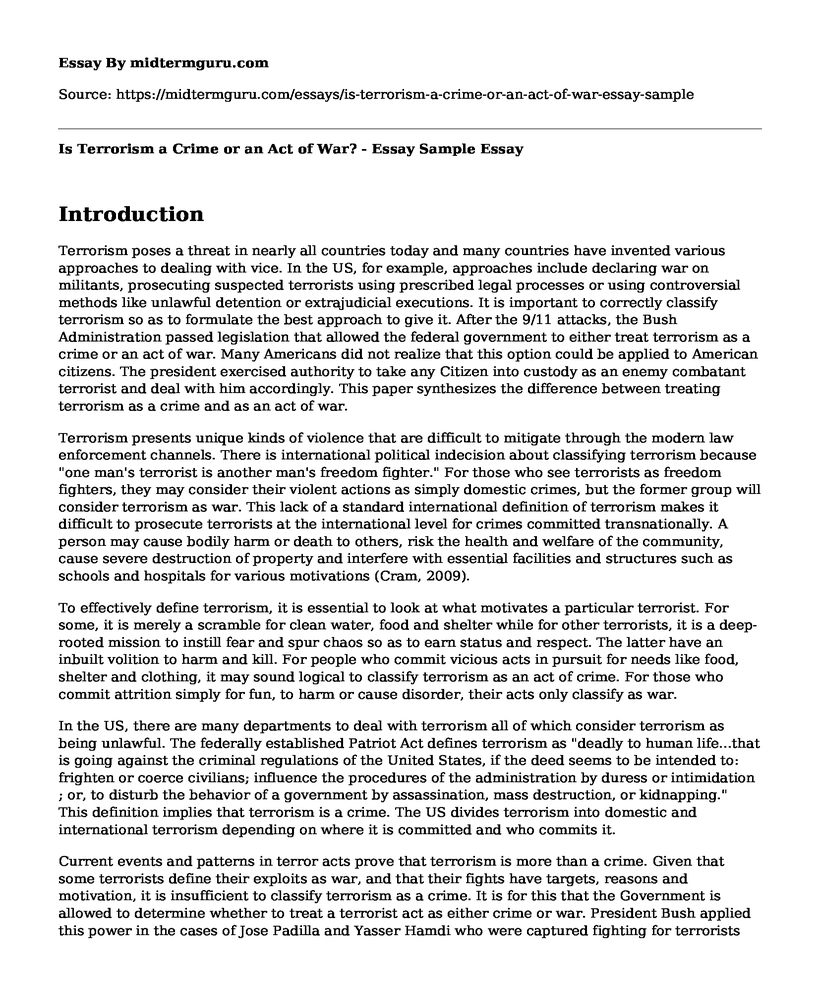Introduction
Terrorism poses a threat in nearly all countries today and many countries have invented various approaches to dealing with vice. In the US, for example, approaches include declaring war on militants, prosecuting suspected terrorists using prescribed legal processes or using controversial methods like unlawful detention or extrajudicial executions. It is important to correctly classify terrorism so as to formulate the best approach to give it. After the 9/11 attacks, the Bush Administration passed legislation that allowed the federal government to either treat terrorism as a crime or an act of war. Many Americans did not realize that this option could be applied to American citizens. The president exercised authority to take any Citizen into custody as an enemy combatant terrorist and deal with him accordingly. This paper synthesizes the difference between treating terrorism as a crime and as an act of war.
Terrorism presents unique kinds of violence that are difficult to mitigate through the modern law enforcement channels. There is international political indecision about classifying terrorism because "one man's terrorist is another man's freedom fighter." For those who see terrorists as freedom fighters, they may consider their violent actions as simply domestic crimes, but the former group will consider terrorism as war. This lack of a standard international definition of terrorism makes it difficult to prosecute terrorists at the international level for crimes committed transnationally. A person may cause bodily harm or death to others, risk the health and welfare of the community, cause severe destruction of property and interfere with essential facilities and structures such as schools and hospitals for various motivations (Cram, 2009).
To effectively define terrorism, it is essential to look at what motivates a particular terrorist. For some, it is merely a scramble for clean water, food and shelter while for other terrorists, it is a deep-rooted mission to instill fear and spur chaos so as to earn status and respect. The latter have an inbuilt volition to harm and kill. For people who commit vicious acts in pursuit for needs like food, shelter and clothing, it may sound logical to classify terrorism as an act of crime. For those who commit attrition simply for fun, to harm or cause disorder, their acts only classify as war.
In the US, there are many departments to deal with terrorism all of which consider terrorism as being unlawful. The federally established Patriot Act defines terrorism as "deadly to human life...that is going against the criminal regulations of the United States, if the deed seems to be intended to: frighten or coerce civilians; influence the procedures of the administration by duress or intimidation ; or, to disturb the behavior of a government by assassination, mass destruction, or kidnapping." This definition implies that terrorism is a crime. The US divides terrorism into domestic and international terrorism depending on where it is committed and who commits it.
Current events and patterns in terror acts prove that terrorism is more than a crime. Given that some terrorists define their exploits as war, and that their fights have targets, reasons and motivation, it is insufficient to classify terrorism as a crime. It is for this that the Government is allowed to determine whether to treat a terrorist act as either crime or war. President Bush applied this power in the cases of Jose Padilla and Yasser Hamdi who were captured fighting for terrorists and detained incommunicado. In both cases, the Supreme Court stated that the Judiciary might not interrupt the President's war-making authority ("Padilla v. Bush/Hamdi v. Rumsfeld (Challenging detention of U.S. citizen without charges or trial)," 2018).
Conclusion
These decisions are understandable because terrorism is a vice that is large in scope always proves too complicated to be combated through domestic legal systems. Thus it makes sense that power is vested in the president on when to treat terrorism as an act of violence or an act of war since the President's decisions will always adjust to prevailing conditions and circumstances.
References
Cram, I. (2009). Terror and the war on dissent: Freedom of expression in the age of Al-Qaeda. Berlin: Springer-Verlag.
Padilla v. Bush/Hamdi v. Rumsfeld (Challenging detention of U.S. citizen without charges or trial). (2018). Retrieved from https://www.nyclu.org/en/cases/padilla-v-bushhamdi-v-rumsfeld-challenging-detention-us-citizen-without-charges-or-trial
Cite this page
Is Terrorism a Crime or an Act of War? - Essay Sample. (2022, Sep 26). Retrieved from https://midtermguru.com/essays/is-terrorism-a-crime-or-an-act-of-war-essay-sample
If you are the original author of this essay and no longer wish to have it published on the midtermguru.com website, please click below to request its removal:
- Essay on Womens Rights Movement and Inequality From the Past to Present
- The Civilian Conservation Corps Program - Economics Essay Sample
- "Housing First" Is A Key to End Homelessness - Essay Sample
- Sex Trafficking in Barbados: Annotated Bibliography
- Paper Example on Discrimination at Workplace
- Paper Example on Immigration of the Mexicans to the United States
- Racial Discrimination in Healthcare: A History of Inequality - Essay Sample







